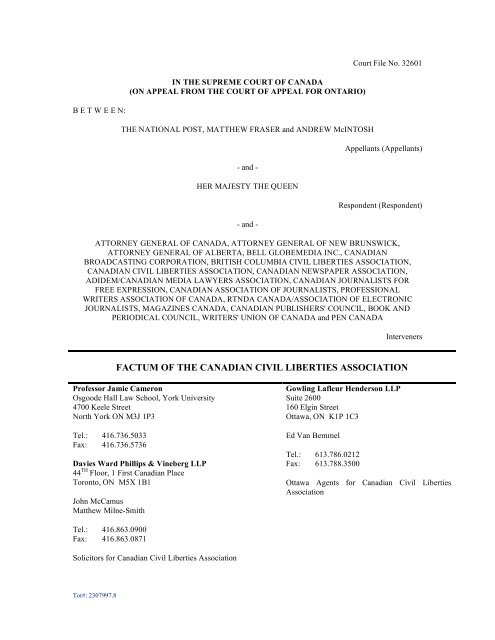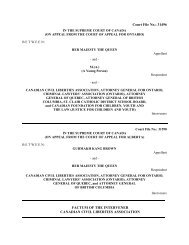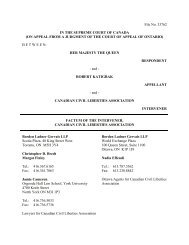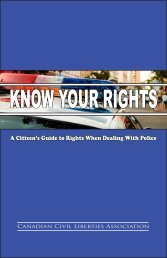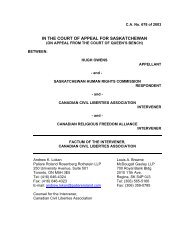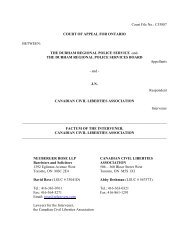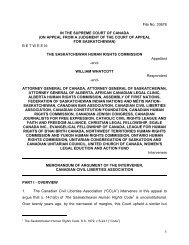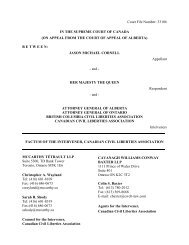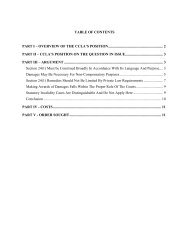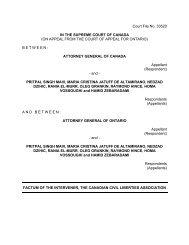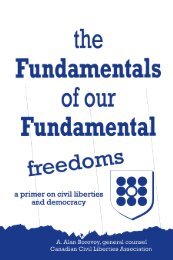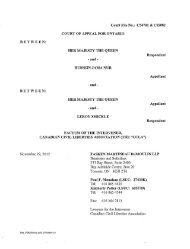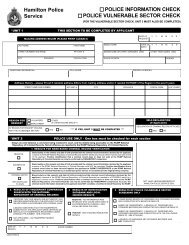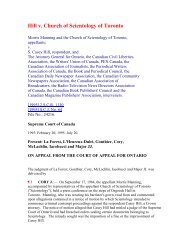FACTUM OF THE CANADIAN CIVIL LIBERTIES ASSOCIATION
FACTUM OF THE CANADIAN CIVIL LIBERTIES ASSOCIATION
FACTUM OF THE CANADIAN CIVIL LIBERTIES ASSOCIATION
You also want an ePaper? Increase the reach of your titles
YUMPU automatically turns print PDFs into web optimized ePapers that Google loves.
IN <strong>THE</strong> SUPREME COURT <strong>OF</strong> CANADA<br />
(ON APPEAL FROM <strong>THE</strong> COURT <strong>OF</strong> APPEAL FOR ONTARIO)<br />
Court File No. 32601<br />
B E T W E E N:<br />
<strong>THE</strong> NATIONAL POST, MAT<strong>THE</strong>W FRASER and ANDREW McINTOSH<br />
- and -<br />
HER MAJESTY <strong>THE</strong> QUEEN<br />
- and -<br />
Appellants (Appellants)<br />
Respondent (Respondent)<br />
ATTORNEY GENERAL <strong>OF</strong> CANADA, ATTORNEY GENERAL <strong>OF</strong> NEW BRUNSWICK,<br />
ATTORNEY GENERAL <strong>OF</strong> ALBERTA, BELL GLOBEMEDIA INC., <strong>CANADIAN</strong><br />
BROADCASTING CORPORATION, BRITISH COLUMBIA <strong>CIVIL</strong> <strong>LIBERTIES</strong> <strong>ASSOCIATION</strong>,<br />
<strong>CANADIAN</strong> <strong>CIVIL</strong> <strong>LIBERTIES</strong> <strong>ASSOCIATION</strong>, <strong>CANADIAN</strong> NEWSPAPER <strong>ASSOCIATION</strong>,<br />
ADIDEM/<strong>CANADIAN</strong> MEDIA LAWYERS <strong>ASSOCIATION</strong>, <strong>CANADIAN</strong> JOURNALISTS FOR<br />
FREE EXPRESSION, <strong>CANADIAN</strong> <strong>ASSOCIATION</strong> <strong>OF</strong> JOURNALISTS, PR<strong>OF</strong>ESSIONAL<br />
WRITERS <strong>ASSOCIATION</strong> <strong>OF</strong> CANADA, RTNDA CANADA/<strong>ASSOCIATION</strong> <strong>OF</strong> ELECTRONIC<br />
JOURNALISTS, MAGAZINES CANADA, <strong>CANADIAN</strong> PUBLISHERS' COUNCIL, BOOK AND<br />
PERIODICAL COUNCIL, WRITERS' UNION <strong>OF</strong> CANADA and PEN CANADA<br />
Interveners<br />
<strong>FACTUM</strong> <strong>OF</strong> <strong>THE</strong> <strong>CANADIAN</strong> <strong>CIVIL</strong> <strong>LIBERTIES</strong> <strong>ASSOCIATION</strong><br />
Professor Jamie Cameron<br />
Osgoode Hall Law School, York University<br />
4700 Keele Street<br />
North York ON M3J 1P3<br />
Tel.: 416.736.5033<br />
Fax: 416.736.5736<br />
Davies Ward Phillips & Vineberg LLP<br />
44 TH Floor, 1 First Canadian Place<br />
Toronto, ON M5X 1B1<br />
John McCamus<br />
Matthew Milne-Smith<br />
Gowling Lafleur Henderson LLP<br />
Suite 2600<br />
160 Elgin Street<br />
Ottawa, ON K1P 1C3<br />
Ed Van Bemmel<br />
Tel.: 613.786.0212<br />
Fax: 613.788.3500<br />
Ottawa Agents for Canadian Civil Liberties<br />
Association<br />
Tel.: 416.863.0900<br />
Fax: 416.863.0871<br />
Solicitors for Canadian Civil Liberties Association<br />
Tor#: 2307997.8
- 2 -<br />
TO:<br />
[TO BE FILLED IN BY GOWLINGS]<br />
AND TO:<br />
Tor#: 2307997.8
TABLE <strong>OF</strong> CONTENTS<br />
OVERVIEW...........................................................................................................................................................1<br />
NEWSGA<strong>THE</strong>RING IS A CONSTITUTIONALLY PROTECTED ACTIVITY............................................2<br />
COMPELLING DISCLOSURE <strong>OF</strong> A CONFIDENTIAL SOURCE BREACHES SECTION 2(B)..............3<br />
<strong>THE</strong> JOURNALIST-SOURCE RELATIONSHIP REQUIRES CHARTER PROTECTION .........................3<br />
<strong>THE</strong> PROPER TEST UNDER <strong>THE</strong> CHARTER .................................................................................................4<br />
SECTION 2(B): ESTABLISHING <strong>THE</strong> PRIVILEGE.......................................................................................5<br />
<strong>THE</strong> SECTION 1 TEST ........................................................................................................................................7<br />
Tor#: 2307997.8
IN <strong>THE</strong> SUPREME COURT <strong>OF</strong> CANADA<br />
(ON APPEAL FROM <strong>THE</strong> COURT <strong>OF</strong> APPEAL FOR ONTARIO)<br />
Court File No. 32601<br />
B E T W E E N:<br />
<strong>THE</strong> NATIONAL POST, MAT<strong>THE</strong>W FRASER and ANDREW McINTOSH<br />
- and -<br />
HER MAJESTY <strong>THE</strong> QUEEN<br />
- and -<br />
Appellants (Appellants)<br />
Respondent (Respondent)<br />
ATTORNEY GENERAL <strong>OF</strong> CANADA, ATTORNEY GENERAL <strong>OF</strong> NEW BRUNSWICK,<br />
ATTORNEY GENERAL <strong>OF</strong> ALBERTA, BELL GLOBEMEDIA INC., <strong>CANADIAN</strong><br />
BROADCASTING CORPORATION, BRITISH COLUMBIA <strong>CIVIL</strong> <strong>LIBERTIES</strong> <strong>ASSOCIATION</strong>,<br />
<strong>CANADIAN</strong> <strong>CIVIL</strong> <strong>LIBERTIES</strong> <strong>ASSOCIATION</strong>, <strong>CANADIAN</strong> NEWSPAPER <strong>ASSOCIATION</strong>,<br />
ADIDEM/<strong>CANADIAN</strong> MEDIA LAWYERS <strong>ASSOCIATION</strong>, <strong>CANADIAN</strong> JOURNALISTS FOR<br />
FREE EXPRESSION, <strong>CANADIAN</strong> <strong>ASSOCIATION</strong> <strong>OF</strong> JOURNALISTS, PR<strong>OF</strong>ESSIONAL<br />
WRITERS <strong>ASSOCIATION</strong> <strong>OF</strong> CANADA, RTNDA CANADA/<strong>ASSOCIATION</strong> <strong>OF</strong> ELECTRONIC<br />
JOURNALISTS, MAGAZINES CANADA, <strong>CANADIAN</strong> PUBLISHERS' COUNCIL, BOOK AND<br />
PERIODICAL COUNCIL, WRITERS' UNION <strong>OF</strong> CANADA and PEN CANADA<br />
Interveners<br />
<strong>FACTUM</strong> <strong>OF</strong> <strong>THE</strong> <strong>CANADIAN</strong> <strong>CIVIL</strong> <strong>LIBERTIES</strong> <strong>ASSOCIATION</strong><br />
Overview<br />
1. The CCLA takes no position on the outcome of this appeal and limits its<br />
argument to the test for establishing a privilege for confidential journalist sources in light<br />
of the Charter. Newsgathering is at the core of s. 2(b)'s values, and confidential sources<br />
are an important newsgathering tool. As such, an order under the Criminal Code that<br />
would compel the disclosure of a confidential source – whether reasonable or not under s.<br />
8 of the Charter – presumptively violates s. 2(b) of the Charter and must be justified<br />
under s. 1.<br />
2. The CCLA proposes a straightforward test. If the target of a search<br />
warrant or assistance order can establish that (a) he or she is a journalist, and (b)<br />
execution of the order would likely result in a breach of source confidentiality, then the<br />
execution of the order violates s. 2(b) of the Charter. For the search to proceed, the<br />
Tor#: 2307997.8
- 2 -<br />
Crown must justify the breach of s. 2(b) using the Dagenais/Mentuck test to balance the<br />
interests at stake under s. 1 of the Charter. 1<br />
Part I ~ Facts<br />
3. The CCLA accepts the facts as set out in the appellants' factum.<br />
Part II ~ Issues<br />
4. The CCLA will address only the first four constitutional questions stated<br />
in Chief Justice McLachlin's Order dated November 17, 2008.<br />
Part III ~ Argument<br />
Newsgathering Is a Constitutionally Protected Activity<br />
5. Newsgathering is protected by the Charter and is at the core of s. 2(b)'s<br />
values. In recognizing that a free and vigorous press plays a vital role in democratic selfgovernment,<br />
this Court has held that s. 2(b) protects the right to gather as well as to<br />
disseminate information. As Justice La Forest stated in Canadian Broadcasting<br />
Corporation v. New Brunswick (Attorney General), "measures that prevent the media<br />
from gathering . . . information, and from disseminating it to the public, restrict the<br />
freedom of the press". 2<br />
6. In discussing the role of the press, the Court has recognized that access to<br />
news sources is a key element of the newsgathering function. It is in the public interest<br />
that the press have access to sources that enable timely reporting and commentary on<br />
public institutions and events. Indeed, the Charter must protect against laws that limit<br />
such access. When the press fulfills its newsgathering role, it promotes a well-informed<br />
public that is equipped to discuss and debate the issues of the day. The relationship<br />
1<br />
2<br />
Dagenais v. Canadian Broadcasting Corporation, [1994] 3 S.C.R. 835; R. v. Mentuck, [2001] 3<br />
S.C.R. 442.<br />
[1996] 3 S.C.R. 480 at para. 26.<br />
Tor#: 2307997.8
- 3 -<br />
between democracy, a well-informed public, and a free press, the Court has stated, is "the<br />
raison d'être of the s. 2(b) guarantees". 3<br />
Compelling Disclosure of a Confidential Source Breaches Section 2(b)<br />
7. As newsgathering lies at the core of s. 2(b), so too does a journalist's<br />
ability to gather news by entering into relationships that are based on a promise to protect<br />
the confidentiality of the source's identity. An order that effectively requires a journalist<br />
to disclose the identity of a confidential source threatens the integrity of this relationship<br />
between journalists and their sources. As the Ontario Court of Appeal recently<br />
recognized, the "likely effect of revealing a journalist's confidential source will be to<br />
discourage from coming forward other potential sources, who, for whatever reason, need<br />
to conceal their identity." 4<br />
8. To infringe on a journalist's ability to obtain confidential sources is to<br />
infringe on the newsgathering function, and therefore on s. 2(b). Any analysis of when<br />
and in what manner journalists can protect their sources must therefore accommodate the<br />
protections of s. 2(b).<br />
The Journalist-Source Relationship Requires Charter Protection<br />
9. The journalist-source privilege has traditionally been adjudicated<br />
according to the traditional common law "Wigmore" test. 5 The Wigmore test predates<br />
the Charter, and applies to numerous relationships such as doctor-patient, psychiatristpatient<br />
and family counsellor-client. While these relationships raise important issues,<br />
they do not necessarily or inevitably engage Charter rights.<br />
10. However any other relationships may be characterized, those required for<br />
newsgathering involve constitutionally protected activity. As will be explained in the<br />
next section, the Wigmore test was never intended to, and does not, in fact, offer the<br />
3<br />
4<br />
5<br />
Ibid at para. 23.<br />
St. Elizabeth Home Society v. Hamilton (City), (2008), 89 O.R. (3d) 81 at para. 34 (Ont. C.A.).<br />
R. v. McClure, [2001] 1 S.C.R. 445 at para. 29.<br />
Tor#: 2307997.8
- 4 -<br />
protections necessary for constitutionally protected activities. In this regard, the Ontario<br />
Court of Appeal erred in this case in concluding that the journalist-source privilege is<br />
governed by the common law Wigmore test.<br />
The Proper Test Under the Charter<br />
11. The Court of Appeal concluded that "both the section 2(b) analysis and the<br />
Wigmore analysis require the same balancing". 6 This appears misconceived. Wigmore<br />
provides a common law approach which is inappropriate where Charter rights, such as<br />
the journalist-source privilege, are necessarily at stake.<br />
12. As described above, the Wigmore test applies at common law to determine<br />
whether a relationship gives rise to a privilege in a variety of circumstances, some of<br />
which may not implicate the Charter. Under the Wigmore test those claiming the<br />
privilege have the burden to establish four criteria: they must establish the privileged<br />
nature of the relationship (i.e., the first two steps of the test), and must also demonstrate<br />
that the interest in protecting the relationship outweighs the competing interest in<br />
disclosure (i.e., the third and fourth steps of the test).<br />
13. The Wigmore criteria do not distinguish between relationships that are<br />
constitutionally protected, and relationships that are not. Wigmore is not, and was never<br />
intended to be, a safeguard for Charter rights. Where the privilege in question is<br />
constitutional in nature, it is incompatible with the thrust of Charter jurisprudence to<br />
require the claimant to demonstrate that the entitlement outweighs the state's interest in<br />
disclosure. Throughout the Charter's history, this Court has consistently held that once a<br />
party establishes a breach of the Charter, the burden shifts to the state to justify that<br />
breach.<br />
14. The CCLA addresses these limitations of the Wigmore test by proposing a<br />
two-step, Charter-based approach to the question of journalist-source privilege. The first<br />
step requires a journalist to show that information was obtained (1) by a journalist, (2) in<br />
6<br />
Judgment of the Court of Appeal, Appellants' Record, Vol. I, para. 76.<br />
Tor#: 2307997.8
- 5 -<br />
the course of newsgathering activities, and (3) under a promise that the journalist will<br />
protect the confidentiality of the source. These three elements are derived from the<br />
Charter's protection of newsgathering, but are nonetheless analogous to the first two<br />
elements of the Wigmore test. If they are met, a s. 2(b) privilege arises.<br />
15. Once the journalist establishes a prima facie privilege under s. 2(b), the<br />
burden shifts to the Crown to justify the breach under s. 1. Under the second step of the<br />
CCLA’s approach, the government has the burden to demonstrate that the state’s interest<br />
in gaining access to the privileged information outweighs the Charter interest in<br />
protecting the journalist-source privilege.<br />
16. In the remainder of this factum, the CCLA will elaborate on the two steps<br />
of the test set out above. Before doing so, it should be noted that the CCLA does not<br />
consider who is a journalist, for purposes of a journalist-source privilege under section<br />
2(b), as the issue does not arise here and it is unnecessary to address it in this appeal.<br />
Section 2(b): Establishing the Privilege<br />
17. As mentioned above, the constitutional status of newsgathering and the<br />
importance of journalist-source confidentiality to the newsgathering function make the<br />
journalist-source relationship a distinctive one for Charter purposes. Charter rights<br />
demand Charter protections.<br />
18. Any attempt to violate the confidentiality of a source threatens<br />
newsgathering and therefore breaches s. 2(b). Every exposed source – no matter what the<br />
context is – will make the next source less willing to come forward. A breach of<br />
journalist-source confidentiality may still be justifiable in particular cases, such as where<br />
a confidential source in a position of power deliberately misleads a journalist in order to<br />
manipulate public opinion. However, that analysis must satisfy the requirements of s. 1<br />
in order to protect the constitutional interests at stake.<br />
19. Journalist-source privilege is therefore distinguishable from other cases<br />
where courts have ruled that Wigmore applies to the question of privilege. In R. v.<br />
Gruenke, for instance, this Court considered a claim to privilege by a woman who<br />
Tor#: 2307997.8
- 6 -<br />
confessed that she had committed murder to a lay counselor and a pastor. 7<br />
The Court<br />
held that the communications at stake in that case did not lie at the heart of s. 2(a)'s<br />
guarantee of religious freedom:<br />
The extent (if any) to which disclosure of communications<br />
will infringe on an individual's freedom of religion will<br />
depend on the particular circumstances involved, for<br />
example: the nature of the communication, the purpose for<br />
which it was made, the manner in which it was made, and<br />
the parties to the communication. 8<br />
20. Gruenke itself illustrated the Court's point. The confession in question<br />
was made to relieve emotional stress, not for a religious or spiritual purpose. 9 Certain<br />
communications between an individual and a religious officiant, even if intended to be<br />
confidential, may not warrant protection under s. 2(a). It is therefore unnecessary to<br />
place the burden on the government to justify invasion of the privilege under s. 1, and<br />
Wigmore can still apply.<br />
21. The same cannot be said of journalist-source confidentiality and s. 2(b).<br />
Any attempt to violate the confidentiality of a source threatens newsgathering and<br />
therefore infringes s. 2(b). While a breach may be justifiable in an individual case, that<br />
justification must satisfy the requirements of s. 1.<br />
22. The CCLA takes no position in this appeal on the reasonableness of the<br />
orders under s. 8, other than to observe that the expectation of privacy would be very high<br />
in any relationship where a source provides information to a journalist, under a promise<br />
that the journalist will protect the confidentiality of the source. The CCLA's position in<br />
this appeal is that, independently of section 8, an assistance order or search warrant that<br />
would compel the disclosure of a journalist's confidential source infringes s. 2(b) of the<br />
7<br />
8<br />
9<br />
[1991] 3 S.C.R. 263.<br />
Ibid at 289.<br />
Ibid at 292.<br />
Tor#: 2307997.8
- 7 -<br />
Charter and must be justified under s. 1. Simply put, in the context of this appeal s. 8<br />
and s. 2(b) address complementary, but different rights. Just as s. 2(b) cannot determine<br />
the reasonableness of a search, s. 8 cannot protect s. 2(b) rights. Government actions that<br />
implicate both provisions, like searches of the media, must satisfy both tests.<br />
23. This Court's earlier decisions about searches of media organizations 10 do<br />
not govern in this appeal because the searches in those cases did not violate a privilege or<br />
infringe upon newsgathering. For example, Lessard involved a warrant for a videotape<br />
held by the CBC that allegedly recorded the commission of a crime. Forcing the CBC to<br />
disclose the tape had little or no effect on newsgathering. The videotape had already<br />
been aired twice, a factor that Justice Cory considered "a very important factor". 11 Nor<br />
did the search warrant prevent the CBC from airing the tapes in the future, or from<br />
filming video footage in the future. The search warrant was reasonable under s. 8, and s.<br />
2(b) was not violated.<br />
24. In this case, however, the relationship between journalists and their<br />
sources is at the heart of the newsgathering function and s. 2(b)'s guarantee of freedom of<br />
the press. Each disclosure of a confidential source could well deter future sources from<br />
stepping forward. This infringes the right of the press to gather and publish the news, and<br />
the public's right of access to news. Regardless of whether the Crown has satisfied s. 8,<br />
this infringement of s. 2(b) must be justified under s. 1.<br />
The Section 1 Test<br />
25. A journalist-source privilege which is protected by s. 2(b) can only be<br />
violated when it is justifiable to do so under s. 1. Both the common law and statutory law<br />
must be applied in a manner consistent with the Charter. This Court has established that<br />
the Dagenais/Mentuck test applies to determine whether the exercise of a judicial<br />
10<br />
11<br />
Canadian Broadcasting Corporation v. Lessard, [1991] 3 S.C.R. 421; Canadian Broadcasting<br />
Corporation v. New Brunswick (Attorney General), [1991] 3.S.C.R. 459.<br />
Lessard, ibid at 447.<br />
Tor#: 2307997.8
- 8 -<br />
discretion – at common law or under a statutory provision, as is the case in this appeal –<br />
is in compliance with the Charter. 12<br />
26. This same test applies to any assistance order or search warrant that would<br />
violate a journalist-source privilege protected by s. 2(b). Under the second step of the<br />
CCLA's proposed methodology in this appeal, confidential information obtained by a<br />
journalist in the course of newsgathering is protected from disclosure unless (1)<br />
disclosure is necessary to prevent a serious risk to the proper administration of justice and<br />
alternative means of obtaining the information are not available; and (2) the salutary<br />
effects of compelling disclosure outweigh the deleterious consequences for the journalistsource<br />
privilege and for newsgathering under s. 2(b) of the Charter.<br />
27. This standard of justification has its origins in Dagenais, where it applied<br />
to balance the competing interests in the open court principle and the accused's right to a<br />
fair trial. Since Dagenais, this test has been applied, with slight modifications, to<br />
determine the permissibility of closing a courtroom under a provision of the Criminal<br />
Code (Canadian Broadcasting Corporation v. New Brunswick (Attorney General) 13 ), to<br />
test the constitutionality of a publication ban to protect information about undercover<br />
police operations (R. v. Mentuck; 14 R. v. O.N.E. 15 ), and to determine the status of a secret<br />
hearing under the Criminal Code's anti-terrorism provisions (Re Vancouver Sun 16 ).<br />
28. The test which the Court introduced in Dagenais and modified in Mentuck<br />
provides a versatile way to balance freedom of expression and other important rights and<br />
interests because it "reflects the substance of the Oakes test" 17 and incorporates "the<br />
12<br />
13<br />
14<br />
15<br />
16<br />
17<br />
Canadian Broadcasting Corporation v. New Brunswick (Attorney General) (1996), supra.<br />
Ibid.<br />
[2001] 3 S.C.R. 442.<br />
[2001] 3 S.C.R. 478.<br />
[2004] 2 S.C.R. 332.<br />
Dagenais, supra at 878.<br />
Tor#: 2307997.8
- 9 -<br />
essence of the balancing of the Oakes test". 18 For that reason, the Court has indicated<br />
that the test is not limited to the open court principle but can apply to many other rights<br />
and interests.<br />
29. The Dagenais/Mentuck standard is appropriate for the journalist-source<br />
privilege, for two reasons. First, the test incorporates the Oakes criteria that require the<br />
government to justify an interference with the journalist-source privilege. The privilege<br />
must be protected unless the Crown can prove that alternative means of obtaining the<br />
information are not available, and disclosure is necessary to prevent a serious risk to the<br />
proper administration of justice. The court must also balance the salutary effects for the<br />
administration of justice against the deleterious consequences of compelling disclosure,<br />
for newsgathering and freedom of the press.<br />
30. The first element in the test requires the Crown to demonstrate that the<br />
disclosure is necessary and rationally connected to a concrete investigative purpose. It is<br />
not sufficient to show that obtaining this information would be a logical step in the<br />
investigation. The necessity of obtaining the information must be based on more than<br />
mere speculation and possible utility, and alternative means of acquiring it must be<br />
unavailable.<br />
31. The second reason that the Dagenais/Mentuck standard is appropriate is<br />
that the balancing that takes place under the second branch of the test reflects the third<br />
and fourth requirements of the Wigmore test, but properly places the burden of justifying<br />
the breach of a journalist-source privilege on the government. The competing interests on<br />
both sides must be carefully weighed in this balancing exercise.<br />
32. For instance, in assessing the salutary benefits for the administration of<br />
justice, the seriousness of the matter under investigation should be a factor. At a<br />
minimum, the Crown should demonstrate that the government is addressing a serious<br />
threat to life, limb, liberty, health, or the physical safety and defense of the state itself.<br />
18<br />
Re. Vancouver Sun, supra at para. 28.<br />
Tor#: 2307997.8
- 10 -<br />
Then, in addressing the deleterious consequences for expressive freedom, the court must<br />
take into account the chilling effects of any government interference with the most<br />
private and in many ways most distinctive tool of newsgathering — the journalist's access<br />
to confidential sources of information.<br />
33. Another important issue in the balancing analysis is that it is not sufficient<br />
for the government to show that the information provided by the source was false,<br />
evidence of a distinct crime, or even criminal itself. Whistle blowers might be breaking<br />
laws when they disclose confidential information, but if that were enough to overcome<br />
the privilege, the protection would be eliminated in some of the most important instances.<br />
Similarly, the falsity of the information should not vitiate the protection. If the source<br />
has knowingly misled the journalist, this could be a relevant factor in the balancing<br />
analysis. If, however, there is no evidence to suggest that the source knew the<br />
information was false or intentionally manipulated the journalist in an attempt to publish<br />
misleading information, the privilege should not be undermined because the information<br />
the source passed on in good faith was ultimately false.<br />
Part IV ~ Submissions on Costs<br />
34. The CCLA seeks no costs and asks that no costs be awarded against it.<br />
Part V ~ Order Requested<br />
35. The CCLA takes no position on the outcome of this appeal.<br />
April 20, 2009<br />
ALL <strong>OF</strong> WHICH IS RESPECTFULLY SUBMITTED<br />
John McCamus<br />
Jamie Cameron<br />
Matthew Milne-Smith<br />
Counsel for the Canadian Civil Liberties<br />
Association<br />
Tor#: 2307997.8
Part VI ~ List of Authorities<br />
1. Canadian Broadcasting Corporation v. Lessard, [1991] 3 S.C.R. 421<br />
2. Canadian Broadcasting Corporation v. New Brunswick (Attorney General),<br />
[1991] 3 S.C.R. 459<br />
3. Canadian Broadcasting Corporation v. New Brunswick (Attorney General),<br />
[1996] 3 S.C.R. 480<br />
4. Dagenais v. Canadian Broadcasting Corporation, [1994] 3 S.C.R. 442<br />
5. R. v. Gruenke, [1991] 3 S.C.R. 263<br />
6. R. v. McClure, [2001] 1 S.C.R. 445<br />
7. R. v. Mentuck, [2001] 3 S.C.R. 442<br />
8. R. v. O.N.E., [2001] 3 S.C.R. 478<br />
9. Re Vancouver Sun, [2004] 2 S.C.R. 332<br />
10. St. Elizabeth Home Society v. Hamilton (City) (2008), 89 O.R. (3d) 81 (Ont.<br />
C.A.)<br />
Tor#: 2307997.8
Fundamental freedoms<br />
Part VII ~ List of Legislation and Constitutional Provisions<br />
Updated on January 25, 2007<br />
R.S.C. 1985, Appendix II, No. 44, Schedule B, s. 2<br />
Constitution Act, 1982<br />
1982, c. 11, Schedule B (U.K.)<br />
[Reprinted in R.S.C. 1985, App. II, No. 44, Schedule B]<br />
Part I<br />
Canadian Charter of Rights and Freedoms<br />
Fundamental Freedoms<br />
SECTION 2.<br />
2. Everyone has the following fundamental freedoms:<br />
(a) freedom of conscience and religion;<br />
(b) freedom of thought, belief, opinion and expression, including<br />
freedom of the press and other media of communication;<br />
(c) freedom of peaceful assembly; and<br />
(d) freedom of association.<br />
1982, c. 11, Schedule B (U.K.), s. 2, effective April 17, 1982.<br />
Tor#: 2307997.8


